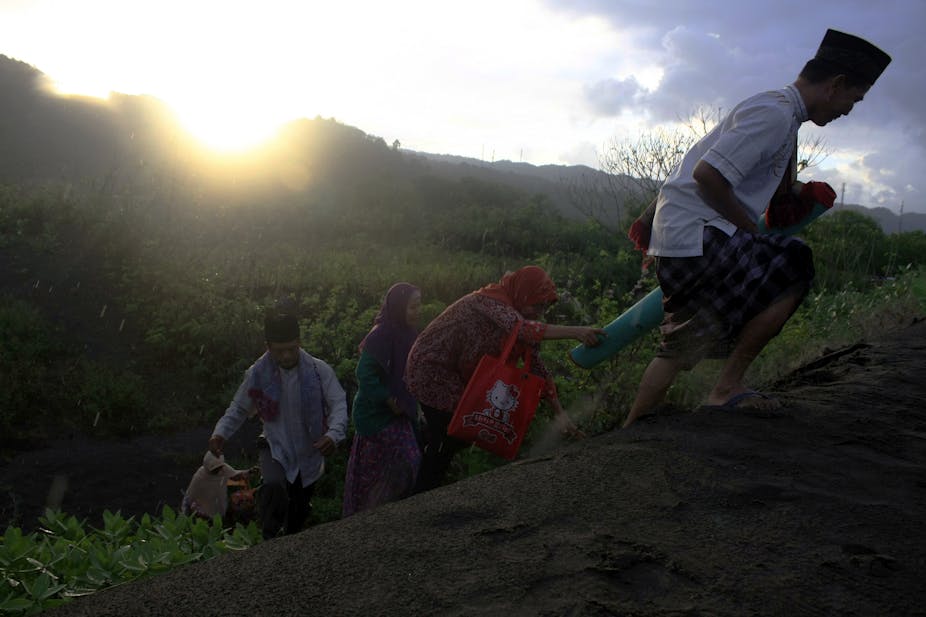Indonesia, having grappled with problems of religious intolerance and violence, seems to be making efforts to improve religious freedom.
Indonesia’s religious affairs minister, Lukman Syaifuddin, is drafting a “protection of religious communities bill” to be introduced next year. By regulating communities rather than beliefs, the bill is expected to provide assurance for a just and peaceful religious life.
Meanwhile, the home affairs minister, Tjahjo Kumolo, has announced that the government will allow citizens of faiths other than the six that are officially recognised to leave the religion column on their ID cards blank. He also warned regional leaders and their administrations not to discriminate against citizens of minority faiths.
These changes coincide with the presidency of Joko Widodo, who took office in October. Jokowi, as Indonesians refer to him, promised to tackle “intolerance and a national identity crisis” and to “strengthen diversity” in his presidential campaign.
Such commitments are important for the protection of religious minority groups, the main targets of intolerance. It is somewhat unusual, though. Protecting minority groups, which are often deemed deviant by orthodox religious groups, has long been considered an unpopular move.
Discrimination against religious minorities

There has been hardly any good news on religious freedom in the last decade, during Susilo Bambang Yudhoyono’s presidency. Religious minority groups such as Christians, Ahmadis and the Shiites have been intimidated and discriminated against. The government often stood back or was even implicated in those actions.
The United States Commission on International Religious Freedom (USCIRF) has categorised Indonesia on the Tier 2 list since 2009, for its serious “violations perpetrated or tolerated by the government”. Tier 2 is only one step away from being classified as a “country of particular concern”.
The Indonesian Constitution states that it protects religious freedom (article 29 [2]). However, some laws, policies and local regulations tend to restrict religious freedom. The 1965 Law on Blasphemy, the 2006 Law on Civil Administration and the joint ministerial decree on houses of worship and on the Ahmadis are just a few examples. Pew Research Centre categorised Indonesia as rating “very high” for government restrictions on religion.
Two main sources of those restrictions are the Religious Affairs Ministry and the Home Affairs Ministry. Both have failed to solve the problem faced by religious minority groups. Worse, they have become part of the problem.
Instead of helping Ahmadis and Shiite refugees, Yudhoyono’s religious affairs minister asked them to convert to Sunni Islam. His home affairs minister supported religious vigilantes, describing the hardline Islamic Defender Front as “an asset to the country”.
That is why, when the newly appointed ministers announced some legal and policy reforms to protect religious minorities, many welcomed this with enthusiasm.
Bucking the trend
These recent developments in Indonesia are encouraging. Compared to other countries in the region, Indonesia seems to be moving away from the trend of religious discrimination.
The Burmese government, under pressure from hardline Buddhist groups, is drafting four bills that regulate religious life. One of the bills will prohibit religious conversion and intermarriage, which is considered to discriminate further against Muslim and Christian minorities.
Malaysia has been known as a moderate nation. But in 2014, USCIRF placed Malaysia on Tier 2 following recent developments of concern. Malaysia has been prosecuting “deviant” groups and prohibited the use of Allah and other words by religious groups outside of Islam.
Law enforcement is key
Despite the above comparisons, Indonesians should not get ahead of themselves.
The new bill is still subject to several considerations. First, bear in mind that the state, by definition, has to protect all of its citizens, regardless of race, religion or sexual orientation. When protection is brought into the realm of religion, one should be wary of its abuse and diversion from the real issue.
For instance, the 2008 Pornography Law that was intended to “protect” women turned out to victimise women. Unless the government annuls all other discriminatory laws and regulations, the new bill would only add to the long lists of government restrictions, instead of protecting minorities.
Second, government practices in dealing with religious conflict also need to be considered. Our research on policing religious conflict in Indonesia found that while some police and local governments failed to prevent violence against minorities, others managed to tackle similar conflicts.
It is great to have good laws in place. But without enforcement, legal protections may do little to protect minorities.
Indonesia also grapples with problems of social hostility. Often, private individuals and social groups infringe on the religious beliefs and practices of others. Pew Research Centre has shown that countries with high levels of religious restriction tend to be associated with high levels of social hostility.
The government needs to ensure that the proposed bill will not cause polarisation within the public, which would only complicate matters and aggravate social hostility. At the same time, the government should not simply succumb to pressure from the majority.

